|
FAQs on Aquatic Insects and Freshwater
Aquariums: Identification
Related Articles:
Invertebrates in Freshwater Aquariums,
Invertebrates for Freshwater
Aquariums by Neale Monks,
FAQs on Aquatic Insects:
Aquatic Insects 1,
Aquatic Insects 2,
Aquatic Insects 3,
Aquatic Insects 4,
Aquatic Insect Identification,
Aquatic Insect Control
FAQs on Aquatic Insects by Group:
Beetles, Dragonflies,
Flies in General (Caddis, Gnats, Midges...),
Freshwater Mites,
Mosquitos/Mozzies and much more!
& FW Invert.s 1,
FW Invert.s 2,
Hydra,
Worms,
Crustaceans, Shrimps, Crayfishes,
W and Brackish
Crabs,
Terrestrial Hermit
Crabs,
|
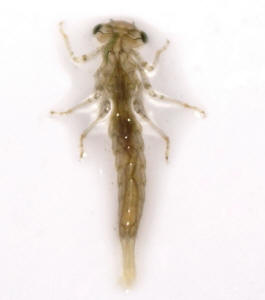
|
|
Freshwater Bugs Identification and course of action needed
7/26/19
Good Afternoon. I have a 100 gal freshwater tank with male peacocks, giant
danios, and Synodontis petricola. Tank is established with canister and sponge
filtration, lightly planted, and no new fish have been added to the tank
recently. Parameters are good, a little high on nitrates but adding extra water
changes. I found a number of extremely small critters just above the water line
that appear to be feeding on a flake of food that stuck to the side of the
glass. They move around a good bit, appear to fight with each other, but I just
would like to know what they are and make sure they are no threat to my tank.
The photo enclosed is very magnified.
Thanks, Cindy.
<Hello Cindy. These are probably members of the Collembola, colloquially known
as Springtails. They're completely harmless, and as you observe, feed on organic
detritus in damp areas. Most aquaria have them, but sometimes they do 'bloom' if
there's a lot of food for them. If you regularly wipe down the glass above the
waterline, and avoid overfeeding, you can control their numbers, But in all
honesty, I'd ignore them! Cheers, Neale.>
|
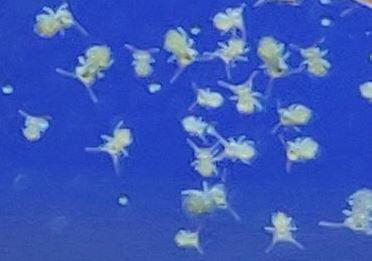 |
|
Large, creepy insect living in aquarium
1/6/19
Hi,
I found this running across the bottom of my yellow bellied turtles 75 gallon
aquarium. It was huge! About a full inch to inch and a half! I caught it in my
net and walked it down to a canal in my neighborhood and released it and ran
home. Lol! I still have the creepy geebies! Can you tell me what it is?
<It's a dragonfly nymph (or larva). While extremely predatory towards aquatic
insects and small fish, it poses no threat at all to your turtles. These nymphs
are famous for having extendible mouthparts that lunge forwards to grab their
prey, and from this action was the inspiration for the mouth-within-a-mouth of
the 'Alien' movie's alien. Cheers, Neale.>
|
.jpeg) |
|
Unidentifiable Squirming Object 11/26/18
Hi
<Greetings Saquib>
Guys I am from a under-developed country, though it's not peculiar to find bugs
and such in the tap water but I have kids and just wanted to be sure what I have
on hands here. I have spotted this fella a couple of times in the tap water and
one time on the clothing too (since we wash clothes with the same water). Can
someone please let me know what this is and if it's harmful. If yes, please
advise what to do.
Regards
Saquib Haider
<Can't quite make this out... is it segmented? Don't see any "mouth parts"; my
best (though general) guess is that this is some sort of insect larvae or
segmented worm (Oligochaete). In both cases it is highly unlikely that either
are deleterious/harmful to humans. Do please send along a better resolved image
if you can.
Bob Fenner>
|
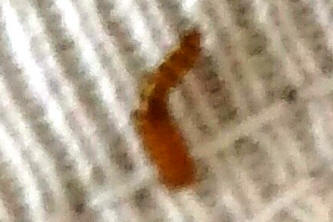 |
|
Question regarding a bug found in aquarium
6/20/18
Hi, I have been the owner of a male and female Betta fish since December 2017.
<Cool.>
They currently reside in a 5 gallon tank with a divider in the middle.
<I bet!>
I recently added 2 mystery snail to the aquarium about 2 months ago and needless
to say, my female Betta died shortly after introducing the snails to the
aquarium.
<Oh.>
I have not had the chance to remove the snail and today, I found this bug on the
mystery snail (who resides in the side where the female Betta used.
I have no clue what this bug is and if there is more. I have tried to look on
line to find it and I had no luck.
<Not obvious to me what this critter is. I'm not convinced it's a true bug
(Hemiptera) and looks vaguely like a beetle of some sort (Coleoptera) and the
proportions most suggestive of one of the Ladybirds. But why such a beetle would
be in an aquarium eludes me. The photo is really much too blurry to offer any
meaningful advice.>
Any clue as to what it is??
<Nope; a sharper photo would be essential.>
I have now removed my male Betta from the aquarium as I don't know what to do
beside clean the aquarium and remove the snails permanently.
<I would not combine Bettas with Apple Snails. This combo
doesn't usually work. More often than not the Betta 'pecks' at the Apple Snail
leading to infection and eventually death. Even if that doesn't happen,
Apple Snails don't consistently survive in aquaria and when they die
they pollute terribly. Not 100% sure what the problem is with Apple Snails, but
may well be some species require a distinct 'resting' period that's best
provided by cooling the tank a bit, and that isn't easy to do if you've got
tropical
fish like Bettas that need a consistent 24-28 C/75-82 F all year long.>
Please help and thank you, Alivia
<Most welcome, Neale.>
|
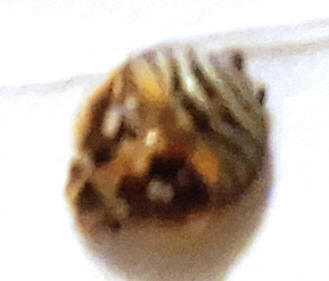 |
Worms in my tub! 5/3/17
Hello! Can you please tell me what kind of worms these are?
<Video
Link HERE>
I found them in my bathtub after giving the kids a bath! We live in
northwest Indiana if that helps any.
<These look like insect larvae; likely hatched from "flies" getting into
the house, some bit of water left in the tub... no worries. Bob Fenner>
|
Worm, Larvae, or other?
3/14/16
Hi There,
<Matt>
Just finished cycling a Fluval Edge 6 gallon aquarium after 4 weeks. I
cycled with pure ammonia from Dr. Tim's Aquatics dosing 4ppm each day the
ammonia read 0ppm. The tank is planted with Helianthus callitrichoides,
Lilaeopsis brasiliensis, Vesicularia dubyana, and a few Aegagropila
linnaei. I dose with Flourish Comprehensive weekly and Fluorish Excel
daily with 12h/day lightning by means of my Finnex Planted+. The plants
are all
growing wonderfully. There are also some snails that hitched a ride on
the Java Moss
<http://www.fishlore.com/fishforum/aquarium-plant-profiles/114960-java-moss-care-sheet.html>
I purchased from my LFS
<http://www.fishlore.com/fishdictionary/l.htm#lfs>
, which I don't mind at the moment.
<Okay>
I have yet to perform a water change
<http://www.fishlore.com/fishdictionary/w.htm#waterchange>
and will do so after I figure out what these pests are. First here are
the water specs to get an idea of the conditions:
pH 7.0
DKH <http://www.fishlore.com/fishdictionary/d.htm#dkh>
4
dGH 4
NH3, NO2 0ppm
NO3 80ppm (as I said, have yet to do a water change
<http://www.fishlore.com/fishdictionary/w.htm#waterchange>
!)
<You're disciplined!>
They
<Who? The worms I'll assume.>
have definitely proliferated in the past few days (probably due to
increased nitrate concentration), with most coming out at night and
wiggling erratically at the top of the tank. Few also float in the water
column during the day. The majority are translucent with some varying
with brown specks. The supposed worms appear to be segmented, which
leads me to believe they are of the Annelid phylum or are larvae of some
kind
<Likely so>
and therefore not Planaria, but then again I could just be seeing
things.
Maybe they are some sort of Dipteran larvae?
<Can you send along a well-resolved pic? The two groups of
invertebrates can be discerned on close inspection>
Please let me know!
Thanks,
Matthew
<Please read here re identifying these groups:
http://wetwebmedia.com/FWSubWebIndex/fwwormidf.htm
and
http://wetwebmedia.com/FWAqInsectF2.htm
Bob Fenner>
Re: Worm, Larvae, or other?
3/14/16
Oh yes! The most important part of the email was omitted! Here is a
photo:
<Ahh; these appear to be insect larvae. I'd vacuum the gravel to remove
them. Bob Fenner>
|
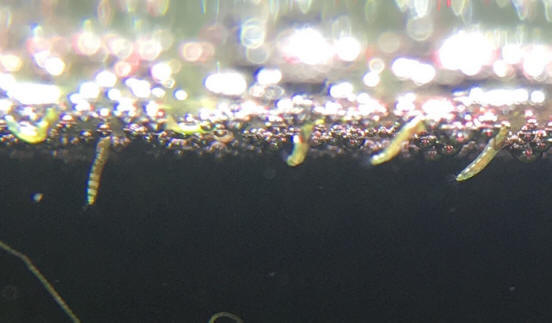 |
|
Re: Worm, Larvae, or other?
3/14/16
Thanks for the help IDing them! I am planning on getting a school of 6
cardinal tetras, so I hope they will find them to be a delicious treat.
<Which? I'd remove the larvae as stated... They may turn out to be fish
eaters, or flying about your house... BobF>
|
Nematode worms 6/19/15
Dear WWM crew,
I happened upon your site following several searches to try and identify the
worm-like creatures I found on the bottom of my outdoor swimming pool.
I realize your site is for aquarium enthusiasts, but your specialists seem
really knowledgeable about worms and larvae, unlike most of the drivel I find in
"Yahoo Answer-like" web postings. Could you help identify the fast wriggling
creatures in the attached video, <insect
pool larv.mov> and recommend how I can get rid of them? They inhabit a 100ft
long outdoor swimming pool for recreational swimming and most users would
probably not like to share their swimming enjoyment with these creatures.
Thank you for your expertise!
Best regards,
Marc de Beer
<There isn't enough detail to say what sort of "worms" these are, whether
annelids, nematodes, Nematomorpha or insect larvae. Nematomorphs are pretty
common though, and generally harmless to us since they infect different sorts of
animals. Unfortunately, chlorine levels in pools are not normally high enough to
kill the durable eggs of some "worms", and insect larvae may appear repeatedly
because the flies, mosquitoes and other species can come to a clean pool and lay
their eggs there. In short, there isn't a one-shot chemical solution to these.
Net them out, and in particular, remove potential hosts as quickly as you can to
prevent possible reinfection -- typical hosts for Nematomorpha are insects
including flies, crickets,
beetles and so on. Cheers, Neale.>
<From the motion of the animal in your MOV, am pretty sure this/these are insect
larva/e... See WWM re. Bob Fenner>
Re: Nematode worms 6/20/15
Thank you so much!
<Welcome>
Best regards,
Marc
<Simple chlorine shocking procedure will very likely rid your system of these
larval insects. BobF>
|
Strange worms in tubes and algae
3/13/15
I have a newly planted freshwater aquarium with no fish. I have a few Amazon
swords, crypts, and Anubias plants. I have 2 t5 fluorescent grow lights. My
planted tanks has some kind of dark green algae with squiggly lines and with
some kind of worms. The worms are growing in some kind of single tube.
<Indeed! Sessile chironomid larvae or similar. Also an Hydra visible in one
photo, the branched, off-white tree-like organism.>
The worms poke their heads out of tube for a few seconds and then go back in the
tube and hide.
<Yes.>
I can't find anything like them on the internet and was hoping you might be able
to tell me what they are and if I should get rid of them and is it safe to put
fish in the tank with them?
<Harmless filter-feeders; fish food. The hydra is a bit more of a risk in a
breeding tank (will catch, eat tiny fry).>
Here is a couple of pictures. Thanks in advance for any help you can provide.
Sincerely, Robert.
<Most welcome. Neale.> |
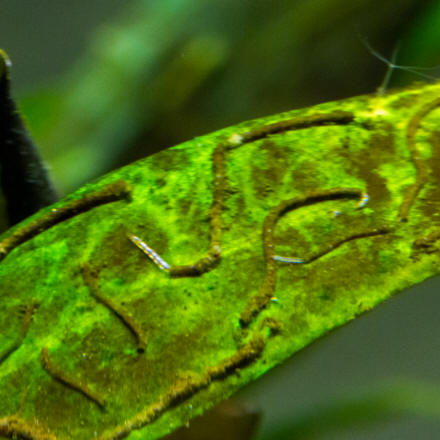 very nice pic.
very nice pic. |
|
Wormlike wigglers in cycling tank
/Neale
2/19/15
Can you guys identify what these are? They appear to be little white
worms in the water but zoomed in they look like larvae of some type.
This is in a new setup about 4 weeks old, no fish, fresh black onyx
sand, RO water, and 81 degree temp. They seem to have come out of no
where. Thanks in advance. Video below image.
<Midge larvae or something similar. Totally harmless, and likely fish
food if you add anything insectivorous of appropriate size (such as
tetras). Not mosquitoes, anyway, which attach to the surface film of
water. Cheers, Neale.>
Wormlike wigglers in cycling tank /RMF
2/19/15
Can you guys identify what these are?
<Mmm; yes>
They appear to be little white worms in the water but zoomed in they
look like larvae of some type. This is in a new setup about 4 weeks old,
no fish, fresh black onyx sand, RO water, and 81 degree temp. They seem
to have come out of no where. Thanks in advance. Video below image.
<Insect larvae... heads appear too small to be mosquitoes, maybe Midge
larvae. I'd net out, remove. Bob Fenner> |
.jpeg) |
|
Re: Wormlike wigglers in cycling tank
2/19/15
Bob,
Thanks for the reply. I added what is now a very full and satisfied
Platy to the tank.
<Heeee! I bet!>
The thing couldn't get to the little morsels fast enough. Happy to say
that all wigglers are gone.
Thanks again.
<Cheers Mark. BobF> |
|
Could you all please I.D.
1/1/15
Any clue? I've asked around, yet nobody seems to know.
<Mmm; would like a bigger, better resolved pic... My initial guess is
that this is a juvenile Tunicate, a larval
Ascidian of some kind/species.
Bob Fenner> |
 Re: Could you all please I.D.
1/2/15
This is the best I have
<Video clip>
I had gotten rid of him, I didn't want him to harm my tank.
<Won't>
Thanks for getting back with me bob fenner
<My guess is still on the Thaliacean. BobF>
Inputs for Bob (Re:
Could you all please ID dated 1/1/2015)
1/3/15
To my Kumpadre Bob,
<Hey Rix!>
Hi! I hope you and the crew had a great time during the holidays. I'd like to
chime in on the erstwhile unidentified organism in the letter dated 1/1/2015. No
info was given regarding the habitat, but if it was collected in freshwater, it
might be a rat-tailed maggot.
<Just looked up; neat!>
I had fun collecting these in anoxic creeks during my younger years in Manila
(gosh the memories haha). Hope this info helps. Thanks for all the help you and
the crew have been providing all these years, and wishing you all the best for
2015.
Salamat!
Rix Pavia
Manila
<Mabuhay mi pare jo! Bob Fenner> |
|
Weird Things in my Tank 11/6/14
Hello, my name is Brooke. I'm writing in regards to these strange
creatures
I found in my boyfriend's fish tank. He has a 29 gallon tank that was
purchased on September 27th. He currently has 3 Gold Danios and a
couple snails. He's waiting for the tank to
cycle before adding other fish. The PH is
about 7.2. The ammonia fluctuates between 0 and 0.25, the Nitrites are 0
and the Nitrates are at 40. He's new to the hobby, but has done
everything according to what the people at our
local fish store have recommended. He keeps
the tank at 76 degrees. He has an Aquaclear 30 filter. He has live
plants that were purchased at the time of the tank, before the
fish. He has, I believe, Fluorite Black
substrate mixed with a little black gravel.
We do weekly 10% water changes. During the water change, he suctions the
substrate as well as he can without digging up plants. I'm not
sure if all of this is useful to you in
helping to ID these creatures, but figured it
would be better to include it, just in case. I noticed the creatures
about a week ago. They looked like small bits
of root coming off some of the plants that
have been floating at the top of the water. The creatures were
green in color, small, and long. After closer inspection, I saw
that there were also some that were a little
larger and brown. I did some research (days of
pouring over Google as well as your site) and couldn't find
anything other than maybe a Damselfly Nymph, but still felt like
it was unlikely. I decided to watch and see
what happened. As they got larger, they
started to look like they had little bug or shrimp bodies sticking out
of the long, skinny, brown "shell," and I could see a "vein"
pumping through the "shell." They also look
like they have a long piece of plant root
attached to their top sides. They don't seem to have a preference as
to which portion of the tank they are in, as long as they are on
something.
I've seen them on plants at the top, walking on the walls, and walking
along on the bottom of the tank. Although, they do seem to like
being on the plants the most. I tried to get a
few pictures of them, though it's
hard as the biggest are only about an inch in length. I'm including a
picture of a smaller one as well as a close up of a larger one
from the top and a larger one from the side.
My main questions are: What are they? Are
they safe to keep? If not, what should I do?
If they are, is there anything
I need to know about their care? I've found them quite
interesting to watch, so I'm hoping they are
keepers. Thank you so much!
<The photos aren't sharp, so can't be sure. But are these Caddisfly
Larvae or something similar? That's what they look like to me. They're
hugely diverse, including some species that eat algae, some that feed on
particles of organic matter, some that capture small invertebrates such
as other insect larvae. I can't think of any that eat fish, and they're
so small none should be a threat to anything bigger than, say, fish fry
anyway. So you might want to observe this beast a while longer. Look up
Trichoptera in your local area and see if any match the animal you have
here. Cheers, Neale.>
|

 |
|
Re: Weird Things in my Tank 11/6/14
Thank you so much! It looks like that is exactly what we have. I suppose
we'll watch them, and once they have emerged from the water, we'll
catch them and let them go outside. They're really
quite fascinating! It's hard to believe they've
built their cases out of stuff they've found in the tank!
I really appreciate all your help as well as your quick reply!
Thanks!
Brooke
|
|
FW parasite ID 8/18/13
Good morning
<And you>
I wondered if you could help with identifying the attached...
I found 8 of them on the bottom of my quarantine tank after treating a
sick platy with an anti-parasite medication (liquid Praziquantel 'Prazi
Pro') . As far as I know they came from inside the poor fish.
<Mmm; appear to be chitinous in this pic... external, or gill cavity
(which is also ext.)...>>
The heads are dark and visible to the naked eye. About 0.3mm across. The
bodies had largely disintegrated before I got them but looked to have been
maybe a cm or so long and worm-like...
<Hmmm; please do send along an image of a whole specimen if you can>
without the dark cuticle (?) visible on the head part. I did see some other
structures - a node with fine hooks or hairs (bursa? couldn't tell which
part it had been attached to) and the structure coming from the inside of
the head shown on the doc. file.
Hunting around on the web the closest I can find is some kind of hookworm
... what do you think? The teeth and claw structures are really distinctive
but I couldn't find a picture of anything quite like these anywhere...
I'd like to know what they are and whether my main tank is likely to be
swarming with eggs and larvae just waiting to latch onto one of my other
fish and whether there is any point in re-treating my sick fish with the
Prazi Pro - she is still very sick-looking and not eating. (It is 7 days
since I first quarantined and treated her)
<If they are worms, the Prazi has likely eliminated them; if crustaceans;
you'll need to treat w/ another compound. See WWM re such for freshwater
fishes.>
Any help/info would be appreciated!
Sarah
<The head, mouth parts, are reminiscent of Ergasilus, some other copepods...
perhaps... Bob Fenner>
|
.jpg)
.jpg)
.jpg)
|
Re: unknown parasite, FW...
8/18/13
Thanks for the quick response! Had a look at Ergasilus spp on the web -
but nowhere seems to mention they have 'teeth' - which are very
distinctive in the species I have and I think would be commented upon
somewhere...
<Mmm, yes>
I have make the attached composite photos of the 2 specimens I have of
bodies ('body 2' has two versions - a light and dark)... I am afraid
both specimens are in pretty bad shape but I had another good look under
the microscope and can't see any obvious structures like legs or chitin
plates etc... so don't know if these help much! I am also not sure if
they are complete or the tail end has broken off - looks broken to me so
there could be missing parts.
<... no apparent legs? Quite common in internal parasites; and of course
worms lack them... But do have eyes; and these too tend to be absent, or
greatly reduced... These appear to be segmented... and still
arthropods...
Did you actually see them being evacuated from the fish's vent?
Am leaning toward (guessing) aquatic insect larvae...
non-parasitic; though can be piscivorous... Do put the string
"freshwater aquatic insect larvae" in your search tool and take a long
look/see at images... do any of these bear close resemblance to what you
have here?>
Sorry about the quality - I am just holding my camera and taking shots
down the microscope tube.
<Good work; better than I could do. BobF>
Sarah
|

 |
Re: unknown parasite
8/18/13
Oh - that's an idea! I'll send the photos to a friend who is an aquatic
invertebrate person... though I have to say I still think they must be
parasitic. I scooped the sick fish out of the aquarium in a small container
to transfer her to the quarantine tank and I think I would have
noticed if these guys were with her. But maybe not! Perhaps there is
something else completely different wrong with the fish...
Sarah
<... do look at the system this fish was hauled from... At the surface
especially. B>
Re: unknown parasite
8/18/13
I agree - the mouthparts do look like those of an insect....
Any suggestions as what to do with my sick fish? Any other treatment (if it
's not an internal parasite) you can suggest?
<As you were first directed.>
Symptoms are - very thin, lethargic, not eating or if eats - spits food out,
has been like this for at least last 2 weeks (was away on vacation before so
not sure how she was...), other fish in original tank all fat and bright,
can't see anything obvious on her externally....
Sarah Re: unknown parasite
8/20/13
FYI Identified the mystery 'parasite'
It's a midge larva!
<Aha!>
Not a parasite at all but residue from feeding bloodworms... must have
been in the water the fish was transferred in (from the main tank) or
from her gut and pooped out once in the quarantine tank...
<Ah yes; as I had guessed>
Back to the drawing board for my diagnosis!
Sarah
<No worries; not harmful. Bob Fenner>
|
|
|
Is this a bloodworm? 4/26/13
I've recently (last few months) started building a freshwater tank - the
last one I had was taken down due to moving to FL, and the fish given to
a LFS (I haven't gotten any new fish yet). I was kayaking
last week and noticed some *Egeria *type plants*,* and grabbed some to
start a planted tank. I kept them out of the tank until
today to make sure there weren't any snail hitchhikers, and today I put
them in my tank. As I was cleaning up and about to throw out some
plant debris, I noticed little tiny red worm-like things flailing around
in the plant matter on my kitchen counter.
After freaking out a bit, I Google searched to see if I could figure out
what they are - they are probably in the tank since I didn't notice them
until *after* most of the plants went in the tank. I'm assuming
they are bloodworms, but could you double check my identification?
<Could be a Chironomid... an insect larval stage of some sort>
I'd hate to have any eventual fish I get subjected to a parasite I pulled
out of a river.
Thank you!
Chelsea
<Welcome. There's always a chance of introducing trouble/s w/ such wild
collecting... Better to run all new material through a few weeks of
isolation/quarantine, before introduction to your main/display system.
Bob Fenner>
|
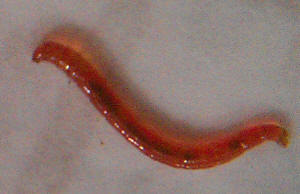 |
worms, FW ID 8/19/12
hi WetWeb,
<Hello Jon,>
I have a question for the freshwater entomologist :
<Hmm… not exactly come to the right place!>
The other day I was watching a shrimp eating a dead shrimp. I guess it's
normal for a shrimp population to somewhat control itself ?
<For sure. Or at least, to recycle calcium from moults or corpses.>
The number of shrimps seems to stay about constant but I don't see very
many babies nor very many grandpas and grandmas.
<Pretty much true.>
Anyway, right near the dead shrimp I noticed a red wormy-looking thing.
I've never seen this thing before. It was about the size and color of a
bloodworm but not segmented.
<If it isn't segmented, it can't either [a] an insect larva such as a
chironomid larva; or [b] an oligochaete such as Lumbriculus.>
Also, it slithered over the rocks rather than doing the bloodworm
motion.
<Gliding over solid surfaces is more typical of flatworms, i.e.,
planarians.>
As I watched, it slithered away into the substrate never to be seen
again. The substrate is round river rock of various sizes. Not too big
but larger than normal aquarium gravel. Kuhli loaches love it. This
thing was slithery like a slug, not free-swimming at all and rounder
rather than flatter.
<Again, suggestive of a planarian.>
I searched the site and found Planaria and leeches but this creature
seemed more evenly shaped than a leech, not fat in the middle with
tapered ends.
<Leeches are segmented; they are of course Oligochaetes.>
And it didn't have the triangular head that Planaria have.
<Ah now, the triangular head with the two eye spots is not universal to
flatworms.>
I searched and searched the rest of the tank but only see/saw the one.
Any ideas what this thing could be ?
<Does sound like a planarian; look at species such as Dugesia which are
fairly common in ponds and get into aquaria via plants and live foods.
They're harmless, by the way.>
thank you,
jb
<Most welcome, Neale.>
Re: worms, FW ID 8/19/20
Thank you for the reassurance :)
<Welcome.>
They sure look nasty icky slimy but we probably aren't very attractive
to them, either …
<Likely so.>
I'm sort of assuming that since this is part of life, as long as they
aren't parasites they're actually good for the tank ?
<Or at least neutral. If you have a lot of them, then that tends to
indicate the tank isn't clean (overstocked, uneaten food, inadequate
maintenance). But a few of them is normal, and in some tanks adds to the
charm of the aquarium. Indeed, I have an 8-gallon aquarium on a sunny
windowsill that's crawling with tiny life such as these worms, and it's
a useful place to grow on small fish like Ricefish fry that feed on
algae and tiny animals. It's a fun tank to observe, almost like a reef
tank.>
Especially since I've only seen one, not thousands ?
<Quite so.>
thanks again much :)
jb
<Cheers, Neale.>
|
Tiny Yellow Bugs 2/6/12
I just cleaned my tank today and noticed these tiny speckles
above the water line. On closer inspection they were crawling.
They are extremely small yellow bugs, no bigger than a pencil
dot.
I looked through your posts and found one question about
something similar. I have seen them floating on the water as
well, but mostly on the side of the tank. I can see antennae and
six legs if I strain my eyes.
I too have a fresh water and live planted aquarium, 20
gallons.
However I believe I know the culprit. I've found these brown
bugs in the same room as my tank, adult size is about a 1/2 inch.
I don't know the proper name, but I was told they're
called Stink Bugs, because of the scent they emit when in danger
or crushed. I found one hanging out on my filter while I was
cleaning. I've found others there before, attracted to the
light and heat, but never saw the little yellow guys before. They
are however very similar with six legs and antennae. Also the
same body shape.
In the photo I've sent you (I apologize for the lack of
detail), you can see tiny little dots just left of center. Those
are the little yellow bugs. I don't have a picture of the
adult stink bug.
I just thought you guys might want an idea of what these tiny
bugs might be. Please let me know if there's anything I can
do to get rid of them. I've been using a paper towel and just
wiping them out.
Thanks for all the great feedback you've given!
<And thanks for the kind words. Anyhow, these are
harmless tiny insects, collembolans, mites,
silverfish'¦ that sort of thing. Quite normal. Nothing
to worry about. The fish don't seem to eat them, but
conversely, they don't seem to damage the fish or plants
either. They're mostly feeding on organic material that
collects in warm, humid places like fish tanks. Cheers,
Neale.>
|
|
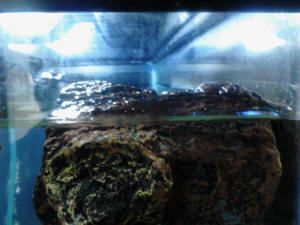
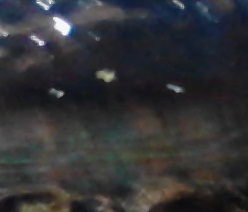
|
|
Freshwater insect larvae ID 6/26/09Crew,
<Hello,>
I mostly tore down my QT tank before going on a work trip 2 weeks
ago.
While I was gone there was gravel enough to cover the bottom and
water to just cover the gravel (maybe 1cm). I was cleaning the
tank today by adding hot tap water and I noticed what I assume
are insect larvae. Sorry the pics are out of focus. The long,
gray UFO (unidentified freshwater object)
is about 1.5 cm actual length. The other 2 are about .5 cm.
<It's the larva of a dipteran of some sort. Midge,
mosquito... something like that.>
No matter what, I plan on having all these things cleared out of
the aquarium before the wife sees them. She hates anything
wriggly!
<They're fish food. Not a problem.>
Thanks for any help.
Evan
<Cheers, Neale.>
|
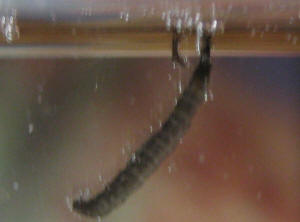
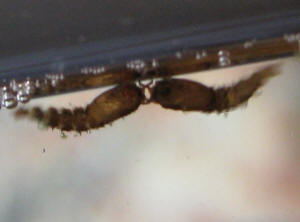 |
|
Weird Creature, Help! 6-15-2009
Hello,
<Howsit?>
I have sent this photo to about 10 sites and not one has
responded, do you guys know what this is?
<It's an aquatic larval insect of some sort... need to see
details of the head to get close as the Order>
I live in Castle Rock, CO at about 6300 feet, these things are
flourishing in my little 3' x 2.5' pond; no circulation,
only duckweed, 1 water hibiscus and 1 water hyacinth.
<Mmm...>
This is a photo of one; it's in a jar, I used the macro
feature on my camera; they are from needle pin dots to 3cm.
Obviously a crustacean (from the tail/abdomen which shows 6
sections) but the body seems upside-down with feet on the top a
large eye?
Any input would be greatly appreciated.
Sincerely,
Theresee
<More pix please. Bob Fenner>
|
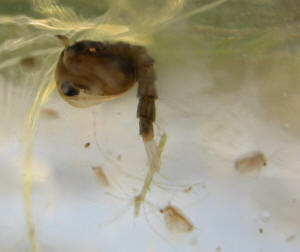 |
Spiders in my silver dollar tank 5/8/2009
Hi guys,
I have Googled till I'm cross-eyed, but still can't find any
advice on a creature I've found in my tank when vacuuming.
It looks like a silver grey spider, body about 5 mm long, 3 mm wide, 6
legs, and is quite active. The total leg span would be about 1.5cm.
<Well, if it has six legs, it's an insect. My guess would be a
Damselfly larva; these are quite commonly seen in fish tanks, coming in
with aquatic plants and portions of live food. They are predatory, but
beyond fish fry, it's hard to imagine them causing real
harm.>
It was cleaning the muck off its feet in the bottom of the bucket and
is quite cute. I'm reluctant to kill it or to put it back incase
it's a parasite and my harm my large silver dollars.
<Damsel- and Dragonfly larvae are indeed fascinating animals, and
easy enough to rear in floating breeding traps. They can be hand-fed
live or (wet) frozen bloodworms using forceps.>
I know they're not in the right tank, I have a large bio-orb, which
is actually difficult to clean as the filter sits in the bottom of the
orb and is quite small, but they grew so quickly, I'll need to buy
another tank.
<I'll say! Just as an aside, BiOrb tanks may look good, but in
terms of fishkeeping, they're very poor value for a whole host of
reasons. Stick to traditional long, rectangular shapes. Avoid anything
tall, round, or otherwise odd in shape.>
My local aquarium isn't much assistance, they couldn't identify
the leech, red thread worms, or little white flea like creatures.
Still, thanks for your advice.
<Happy to help.>
I'm loving owning fish and there's so much to learn. I now have
5 tanks!
Started from one, but fish grew, bred, had personality issues....
I'd better learn quickly.
Cheers,
Lauris
<Cheers, Neale.>
Identify Worm 11/23/08
I live in coastal SC and I kept my turtle tank outside during the
summer and fall. I just brought it in for routine cleaning and because
of cold weather. The tank had some strange "worms" that
looked a little like "naked caterpillars with long string-like
tails." The ones that were moving were a fleshy tan color. There
were also some that were black or dark brown and very hard. Some of
them were in the water but some were attached together by the
"strings" and hanging off of a rock in the tank. I have
looked on many sites and tried many different search terms but am not
coming up with an answer. Please help me identify this strange little
creature. Brandi <Hello Brandi. What you're describing is almost
certainly a "rat-tailed maggot", a distinctive fly larva that
inhabits stagnant water. The long "tail" is a breathing tube.
They're pretty much harmless, and in England at least very common
in small, unfiltered ponds. Fish (and likely turtles) don't seem to
eat them, or at least my fish don't! Cheers, Neale.>
|
Strange Creatures in FW tank 9/20/08
Hi people
On performing a water change earlier today, i noticed a couple of
odd creatures which came from within the gravel of my goldfish
tank. Any idea whether these be friend or foe. Actual size is
around 12mm (½?) in length...
http://fixpix.zoomshare.com/:tools:album?go=proxy:album/Fish/images/661bec64bccf1ba5007686aec62ba640_12218337380/image.jpg
Thanks in advance J
<Hello! This URL asks for a log-in and password. How about
just sending a small (max, 500 k) attachment? That's what
most folks do, and we thank them for it. In the meantime, most
small bugs and worms in fish tanks are harmless. Cheers,
Neale.>
Strange Creatures in FW tank
Hi Neale
On performing a water change earlier today, i noticed a couple of
odd creatures which came from within the gravel of my goldfish
tank. Any idea whether these be friend or foe. Actual size is
around 12mm (½?) in length...
Brad
<Hi Brad. This is, I believe, a Damselfly larvae; looks like a
Dragonfly nymph, but the give-away is the "tail" made
from three filaments. Dragonfly larvae are bigger, have more
robust jaws, and a stubby "tail". Damselfly nymphs are
predatory, but only sufficiently large to take small fish,
perhaps livebearer fry. Otherwise they're fish food! Quite
fun to rear yourself, they can be hand fed bloodworms with
forceps, and it's rather fun to watch their bizarre mouths
anatomy in action. Dragonfly larvae are much more dangerous to
fish, some varieties being anything up to around 8 cm/3"
long (at least here in England) and more than capable of eating
things like minnows. In any case, almost certainly came in with
live plants that were grown outdoors, though possibly in batches
of things like Daphnia. Does rather stretch the imagination to
assume either a Damselfly or Dragonfly flew into your home and
laid its eggs there, but it's possible I suppose! Cheers,
Neale.>
|

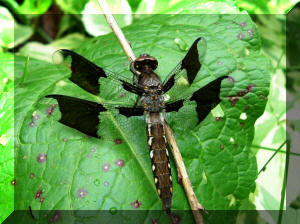 |
|
Re: Strange Creatures in FW tank 9/21/08
Hi Neale
Thank you for the response. Since I only have large-ish goldfish
in the tank, looks like they will not be a problem. I do buy live
plants for my fish to snack on, so I guess that was the ticket in
for the larvae.
Thanks again
Brad :)
<Hi Brad. Those Damselfly larvae should cause no harm to your
Goldfish; in fact I'm surprised they haven't been eaten
yet! Cheers, Neale.>
|
|
George in Greece... worms, copepod... ID
03/16/08 Dear Bob, As you can see in the photo there are two
types of worms and one type of copepod (freshwater). <Can
barely make these out> We are extremely interested in finding
out the following: a) species and if not, genus or even family.
b) are they harmful to fish (esp. fry) Your response will be
greatly appreciated. George & Marina <The blue thing is
obviously some sort of dipteran larva; the red things perhaps
small oligochaetes, but it's difficult to say. In either case
they're fish food rather than a problem! Fish fry *might* be
harmed -- I've lost baby Corydoras to planarians, for
example. But I suspect that the usual problem is that if the
water (or substrate) are "dirty" (bacteria-laden)
enough to support these small life forms, newly-hatched fish are
at greater risk of fungal infections. So in my case at least, the
planarians didn't kill the Corydoras fry, but simply attacked
the moribund ones. That'd be my guess, anyway. Cheers,
Neale>
|
|
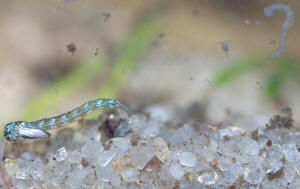
|
Please Help Get Rid of my Flies!!!!(My last resort)
2/10/08 Hello I have scoured The net looking for a question and my
LFS recommended this site, so here we go. First of I am running a 65
gallon fresh water tank. Two HOB Bio Wheels. Heater etc. . My
temperature is usually aprox 77/78 deg. There are two prismatic lens
covers on my aquarium. The transparent kind you see under fluorescents
in stores/ schools. With aprox 6 inch square of open space on each one.
There are 4 Platys 1 Sail Fin Pleco (2.5-3inc) <A what...?> and 12
harlequin Rasboras. The nature of my problem are tiny green flies. They
first appeared on the surface of my water as see threw shells. Within a
day they "fly away" and get stuck under my lid. My LFS said
they could not be actually flies on the water surface and must be a
aquarium pest. Where as since then, I have definably seen them fly
away. When they Grow wings and get bigger aprox 1/2 mm they change into
a fluorescent green. They are located around my filters , and are
reproducing fast. Some one suggested they are coming from my filter
pads. Whereas they are under water. Dose that make sense. The only new
addition to the tank was a batch of aquarium moss. Which has since been
removed. Where as the flies still reproduce and cause me a large head
ache. I clean the inside of the lids every two days now and there are
between 30 and 100 every time. They are so small that when on the water
surface my fish cant see them as such cant eat them either. That is all
I know. Presently I am syphoning water from the surface at my water
changes to attempt to rid them of my tank. Like I said removed all new
additions and am maintaining a regular water change schedule 10/15%
every 2/3 days. Any help would be great. Ps have no photos where as I
can try and resend the email towards the end of the week If need be
with new photos. Just email me and ask thank you ever so much. You are
my last resort. <Well, not precisely sure what these
"flies" are, but I also doubt they are actually true flies,
i.e., Diptera. Fish usually DEVOUR dipteran larvae, and there's not
much chance a population of mosquitoes or some other (semi-) aquatic
fly could actually maintain a population in a fish tank. It is much
more likely you have thrips or some other insect that walks on the
surface of the water. Now, there are two key things to known. Firstly,
they don't do any harm. Most freshwater tanks have played host to
these at some point. They don't carry diseases and they don't
harm your fish. The second thing is that they don't break the laws
of physics: if they're multiplying, its because they're finding
something to eat, most likely decaying fish food. You don't see
these insects in clean tanks with strong water currents. You see them
in tanks with variable levels of cleanliness and filters insufficient
for the tank/population of fish. Even adjusting the filters so that
there is more water circulation will make a difference. In any case,
these insects migrate into the tank from the rest of the house.
They'll come from other warm, moist places. You can't
exterminate them so either make the tank less attractive for them, or
simply ignore them. Cheers, Neale.>
|
Red Worm ID (Royal Plec) 11/19/07 I've
had a 3 1/2" Olive Royal Plec alone in quarantine for 10
days or so. I dewormed with Praziquantel last week at the
recommend dosage (76 mg/10 g) as I know they're wild caught
and don't want to pass anything onto my own fish. He went
into a 20 gal tank with new aged water and a fully cycled Penguin
280 bio-wheel filter from another tank. I did his 25% water
change today (after leaving the Praziquantel in 5 days) and found
these live red worms (pic attached) in the water I syphoned off
the bottom of the tank. Pretty wiggly and entertaining under the
microscope but I can't figure out what they are via the
FAQ's. If they weren't alive I'd have thought they
were frozen bloodworms. I'm hoping it's a harmless worm
that can be treated as the Plec is eventually going in with my
much loved Severum. I promise not to bother you anymore, but
maybe the picture will help others. Mitzi <Looks like a
chironomid larva (a.k.a. midge larva or bloodworm) to me.
Probably got in with some live food. Usually get eaten by fish,
so not common in aquaria. But if this tank was empty for a while,
then it's possible a midge laid some eggs there. In any case,
harmless. Cheers, Neale.>
Re: Red Worm ID (Royal Plec) 11/19/07
Thanks, Neale. I feel stupid then but thankfully that's good
news. I never feed live food, but the driftwood in his tank had
been soaking for a month in a large kiddie pool outside. I rinsed
it off real well but I bet that's where the bloodworms came
from. (The tank had been empty and stored before he went in it).
What a relief! Mitzi <Mitzi, Glad we have a happy ending here!
Cheers, Neale.>
|
|
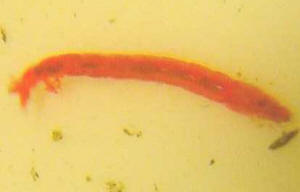
|
Worms in fresh water aquarium
11/29/07 Hi WWM My sister has a fresh water Aquarium which she just
cleaned out on the weekend, and a few days later we have noticed these
worm like creatures in the filter tubes no where else but in them. They
have small legs and are hatching out of these things that look like
cocoons and if you look carefully at them they have small mouths. There
very disturbing to look at and gross us out. There's so many of
them please help! Jessica <Hello Jessica. Without a photo its
impossible to say what they are. But given they have obvious limbs and
mouthparts, one must assume they are some sort of insect. Aquatic
insects vary in their danger to aquarium fish: most are simply
fish-food, but a few, particularly dragonfly (Odonata) and beetle
(Coleoptera) larvae, can turn the tables and will catch and eat small
fish. If you can send a picture, we can try and identify your visitors
with a bit more precision. Cheers, Neale.>
| Re: Alaskan Isopod! One Id down, now on to the
Water Beetle! 11/16/07 <Hi Jack!> Thanks for identifying
the isopod for us. <You're very welcome!> It is known
locally by Inupiat Eskimos as a "toe biter". I doubted
they had the ability to bite toes, but perhaps they actually do.
<I would imagine so. Those isopods can get relatively large -
around 3'. I sure wouldn't want one grabbing hold of my
toe!> We have a large(3 cm) water beetle living in the same
aquarium as our specimens of Saduria entomon. It preyed upon our
snails and is now preying upon the S. entomon. <Ah yes, I see.
The predator becomes the prey!> I have had trouble identifying
it and hope that you can help. <Hope so> It breathes with
head down and stores a large air bubble in its tail region.
<Typical> It is quite buoyant and uses a lot of energy to
dive. <I've seen videos of this. It looks extremely awkward,
and reminds me of trying to see how deep/far I could swim with an
inner tube around me as a kid! LOL I didn't do as well as these
insects, and I'm very thankful that there are no existing
videos to prove it! Regarding identification, unfortunately,
insects are not my strong point. What I can tell you is that since
it's a predacious diving beetle, it's most likely in the
family Dytiscidae. This family, though, has many, many genera and
species in it. The good news is that I found the following link
that supplies a list, for Alaska, that narrows it down
considerably:
http://www.uaf.edu/museum/ento/Insect_Omnibus/Dytiscidae/ The next,
tedious, step would be to go through that list and look up each
specie on the internet. If you do a search based on images, it goes
a lot quicker! I looked through about a third of those listed, and
saw one that appeared similar - Dytiscus circumcinctus. Here's
the link that shows this specie:
http://www.hlasek.com/dytiscus_circumcinctus_ac7200.html Problem
is, while it looks like yours does have something of a light border
around the anterior edges, it doesn't look like it extends all
the way around as is shown at the link. If this is indeed the case,
then it's back to old drawing board - or in this case: the
search engine!> Thanks for any help that you can provide.
<You're very welcome, I just wish I could have given you a
definitive answer!> Jack Adams White Mountain High School We are
located on the Seward Peninsula in Northwestern Alaska. <Indeed
a beautiful area, that's a fact! Take care --Lynn> |
|
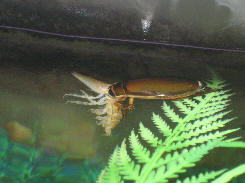
|
Tiny white bugs/crustaceans, FW... 8/29/07 Hi.
Hope you can help me with this one! <Will try.> I have a 5 gallon
freshwater aquarium with a betta fish in it. A few months ago I noticed
a few things: 1) tiny white bugs, barely visible to the naked eye, that
swim/jump through the water and sometimes scoot along the surface of
the glass <Those are very small insects or insect-like animals.
Thrips, collembolans, mites, and so on. Harmless.> 2) tiny things
that stick to the glass and plants. They remind me of barnacles more
than anything else. They are scale-like, flat, transparent beige in
color, and have a small red-orange colored center. They start out as
specks on the glass and progressively grow bigger, to about the size of
a pin-head. They have a hard outer "shell"....I know because
I've been killing them off as best I can ("crunch"), but
they continue to multiply. <Sounds like snails of some sort.
Basically harmless.> 3) tiny red-orange bugs that jump/scoot on the
surface of the water, which remind me of mites or water spiders or
chiggers. <Again, some sort of harmless arthropod. Quite possible
red mites.> I have no idea what any of these are, and my internet
research thus far has not helped. I'm wondering it is it possibly a
single organism that I am witnessing at different points in it's
life growth cycle?? <No, not really. Aquaria become ecosystems of a
sort, and animals in house attracted to warm, damp places congregate on
them. Hence you find the same sorts of things on the aquarium as
you'll find in the bathroom.> A few weeks ago I did a major
overhaul of my tank. I boiled the gravel, driftwood, and filtration
components. I threw away all the plants. I replaced all but about 10%
of the water. Two weeks later, there are tons more of the white bugs,
and I'm seeing more and more of the "scale" looking
things on the glass everyday. <You can't get rid of them. Remove
them, and more will move in from your house. I'm guessing your tank
doesn't have a proper filter; these little arthropods don't
tend to be such a pest where the surface of the water is agitated by a
filter. In "bowl" type situations, the still water surface is
a perfect habitat for them. Furthermore, in betta bowls the water tends
to have lots of nitrate and organic material in it because the volume
is so small, and this encourages the growth of algae and molds. It is
these that the little arthropods are feeding on. In bigger tanks with
proper filtration, there's less of this stuff, and so the
arthropods are less of a big deal.> These critters are such an
EYE-SORE and NUISANCE in my Betta's home. Can you please help me
diagnose this infestation and how I can get rid of them? <You
can't. Learn to love them.> With gratitude, Shawna B. <Hope
this helps, Neale>
Very Tiny Bugs on Water Surface 2/13/07
Hello, <Danielle> I have a 120G Amazonian community tank. It has been set up for
about a year now and is doing well. I have noticed something curious when I do a
water change: there are quite a few (30-50) tiny bugs that hop around on the
surface of the water. <Neat> These bugs are very, very, very small (less than
half a millimeter, I would guess), so small that I can barely see them and too
small to photograph for you (I tried!) - and much too small for even my smallest
fish to notice. I have attempted to catch one and look at it under my
microscope, but have been unsuccessful. <Ahh, at least a "B" for trying> I only
notice them during a water change when the surface is more than 2" below its
full level, the water is still, and my four 65W compact fluorescents are on - I
would not be able to see them otherwise. The bugs do not seem to be swimming or
in the water column. They do not walk on the surface; they just hop (and hop
quite high). <Some lessons in water tension now!> Their shape is that of
a new-model VW Bug, flat on the bottom and a slightly slanted semi-circle on
top. They have a distinct pair of antennae set at about 70 degrees from their
body; one antenna is set at about 90 degrees to the other. At first I
thought they might be dust mites, but dust mites do not have antennae. <Correct>
They are much smaller than fleas (which do not have distinct antennae either).
Have you noticed these in your tank(s)? What are they? Thank you, Danielle
<There are a few groups of "water riding" insects other than the well-known
striders (Hemiptera, Gerridae)... however... what you have here is likely
juveniles of this family... do take a look-see re... These very likely "came in"
with some of your plants... and will cause no harm. Bob Fenner> Sorry - in the
third-to-last sentence, I meant "They are much smaller than fleas..", not "much
bigger". Thank you! I greatly appreciate your efforts! Danielle <Ahh, will
amend. Thank you, BobF>
| Insect ID Hello, we don't know the name
(scientific or common) of this insect and would like to do some
research into exactly what it is. Do any of you WWM Crew know what
the scientific or common name of this is so we can study up on it?
We have never seen anything like it until we found this where we
work. The head and front legs are bright yellow and the rest of it
is dark purple. The tail is at least 4-5" long. I am sending a
picture. Thanks for any help, Jeff <Nice pic. Does appear to be
a species of Mud Dauber Wasp (Hymenoptera: Sphecidae). You can
"look up" much info., other pix with these names on the
Net. Bob Fenner> |
| Re: Insect ID Hello again, it is a wasp
then with stinger as well? <Not necessarily> I assume the
extremely long tail thing is not the stinger but is in the rear of
the insect? <Yes> I entered the name you sent in your e-mail
in ask Jeeves but am only coming up with pics of the common mud
dauber that you mention and that I am familiar with. Any more clues
that would point me to better pics with description on the web?
Thanks ever so much again, Jeff <Do try Google... and words like
"flying insect/s" and your State, general geographical
area. Bob Fenner> |
|
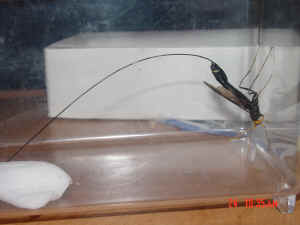
|
|
|

